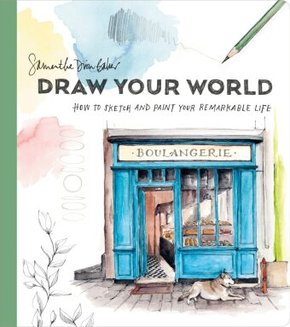
Draw Your World - How to Sketch and Paint Your Remarkable Life
| Verlag | Penguin Random House |
| Auflage | 2021 |
| Seiten | 176 |
| Format | 20,3 x 22,8 x 1,3 cm |
| Gewicht | 528 g |
| Artikeltyp | Englisches Buch |
| EAN | 9781984858207 |
| Bestell-Nr | 98485820UA |
See the world around you in a whole new way with this inspiring guide to nature drawing, urban sketching, travel drawing, drawing from memory or photos, and sketch journaling.
In Draw Your World, Samantha Dion Baker gives you everything you need to begin a new art practice or enliven an existing one. She shares her favorite tools and materials, simple technical lessons such as composition, shadows and light, symmetry, and perspective, plus fun motivational exercises like drawing from memory, urban sketching, travel journaling, and experimental art. With helpful step-by-steps and stunning visual examples from Baker's own work, Draw Your World will help you hone your skills and capture the details of your unique and remarkable life in a sketch journal or as finished artwork.
Leseprobe:
Introduction
I draw every day for at least an hour. The practice is not a burden or a chore but a necessary part of my daily routine, like brushing my teeth or exercising. I guess you could call it a compulsion at this point. Though I feel a need, there is also a deep desire that makes my drawing time a place I go to find peace and calm. In other words, drawing is my meditation. The practice fully represents life in all its ups and downs sometimes it's fabulous and I am so pleased, other times the work is awful and I think I should close up shop for the day and try again the next. The quality of the work I create is dependent on my mood, the amount of sleep I got the night before, the news, the energy my children emit in our home, the confidence felt after a morning run, the insecurities experienced after an awkward conversation with a client, or the hugs I have received from my husband and kids. These feelings come to the surface through my pencil and pen. The practice is a constant reminder that my world is not perfect, that I must work through all of the good and the bad, and that great things can happen as a result of perseverance and making mistakes. I am also reminded that just like in real life, I can forgive and forget, I can deal with any difficulty, and I can make something ugly into something beautiful.
Throughout my career as an illustrator and artist terms I have only allowed myself to embrace in the past five years I have made a consistent and conscious effort to stay true to myself. My work is not perfect, it is not created on an iPad or in Photoshop, and it is not "camera ready," so to speak. It is gritty and real an interpretation of the world around me. I draw my world in my way and I love to encourage others to do the same. I don't make up fantasies when I draw but rather I draw the people and things right in front of me. I find the challenge of translating something onto paper a literal everyday rite of passage.
To day it will be an apple; tomorrow, a building. The next day I will challenge myself a little more and draw my son. I'll drink water and coffee while I draw and then I'll draw that coffee and water. It's not so exciting when you think about it, is it? But on the bright side, when you draw what's right in front of you, there isn't any time for artist's block. In fact, I find it very rewarding to draw the same thing every day. And by doing so, each day I see that thing a little differently. The drawing of that same subject not only changes and evolves because of practice and skill but also alters depending on how free or tight my hand is again, reflecting a direct relationship to the state of mind that comes with that day.
In Giovanni Civardi's Figure Drawing, A Complete Guide, he writes, "To be able to draw means, above all, to be able to 'see,' to understand rationally, to feel emotions, and to master the techniques which allow us to fully express our thoughts and moods." I t is important to understand exactly what the term "mastering" means. It is a scary term for any artist because the idea of mastering something implies pursuing perfection. While I do believe that learning and practicing traditional techniques are very helpful when beginning a drawing practice, it is not about mastering these rules but mastering our own interpretation of them owning our personal style. Arriving at an individual artistic style is a process that can take years. And once we think we have come to that happy place that represents us, we then strive for another level it's a never-ending process and evolution. Early on in my drawing practice, I realized this reality, and it helped me greatly. We grow, we change, we always want more for ourselves, and therefore there will be a feeling of accomplishing that unattainable "mastery" only in small moments. As the world around us shows, we can go backward, then we go forward again.<
